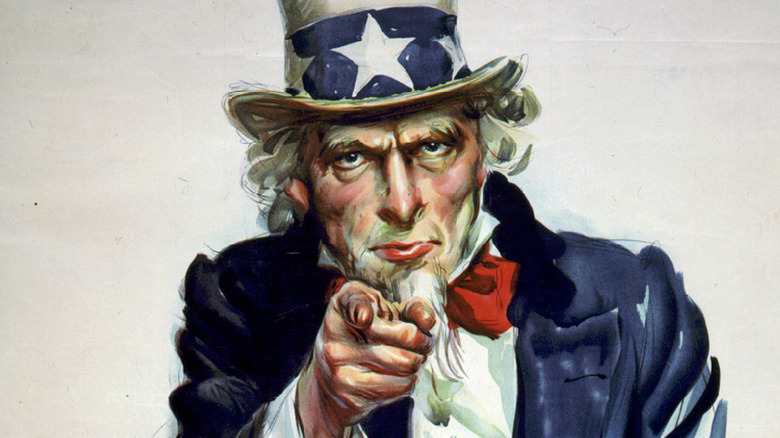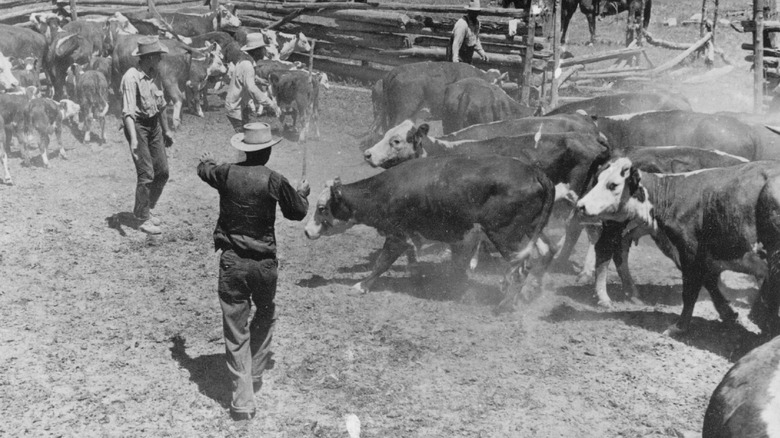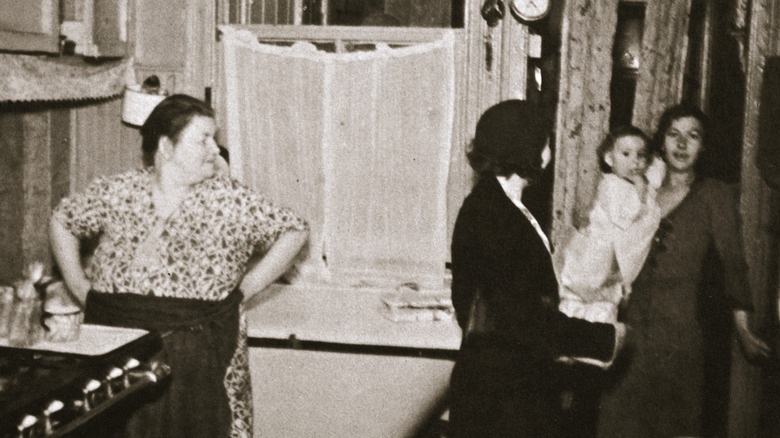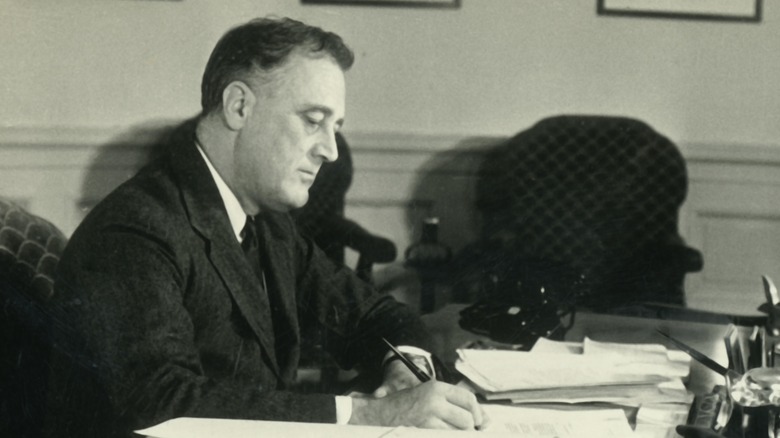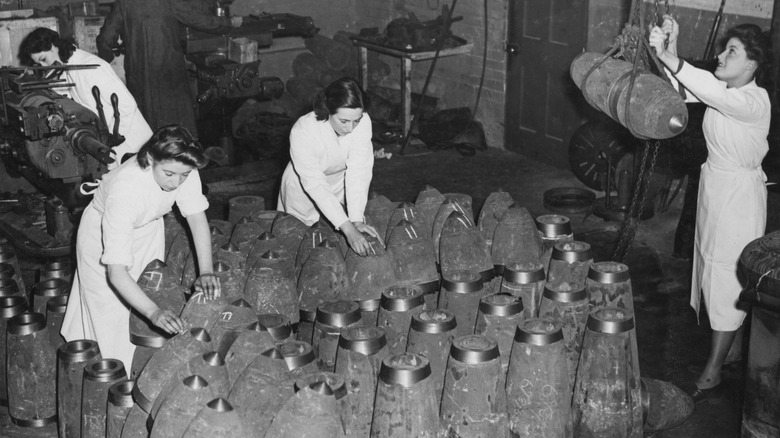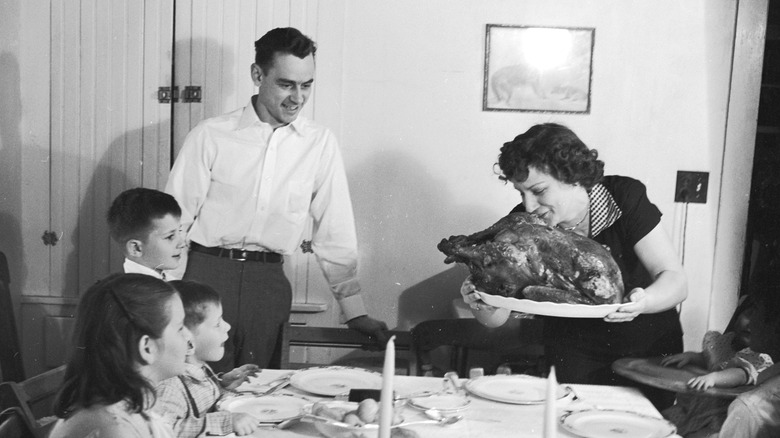The Bizarre Truth Behind WWII Bacon Bombs
Although a "bacon bomb" sounds like a pretty great burger, fats gleaned from household foods such as bacon were also an important part of the American war effort in World War II – or so a coordinated propaganda effort from the Roosevelt administration would have American housewives believe, as The Atlantic reports. The real reason the U.S. military turned to common household food waste for munitions manufacturing, and what actually happened to all that edible gloop, is one of the strangest stories from war-time America.
All sorts of important commodities like steel and aluminum were in short supply during the war, as well as, notably, fat. The push for American housewives to save up their kitchen drippings was so strong, in fact, that animated Disney characters like Pluto and Minnie Mouse helped spread the word (via The Atlantic). Still reeling from the Great Depression, Americans saved and reused almost everything back then, including their kitchen grease. That created a tappable supply for the U.S. government when reserves began to run low.
Americans love their meat
It's no secret that Americans love their meat, stretching all the way back to the time of the colonies. For this reason, a call to donate meat drippings seemed like a truly American thing to do. Per Popular Science, the primacy of meat in the American diet came about from an abundance of fauna in the New World that seemed there for the taking (even though indigenous cultures laid claim to it first). From there, abundant range land and industrialization made meat production an important part of the American way of life.
Health care professionals in the early 20th century and during World War II were largely unconcerned with many of the negative side effects of too much meat consumption, including limiting salt and saturated fats common in beef. Instead, Depression-era vitamin deficiencies and other symptoms of malnutrition were foremost on their minds, while the average American continued to eat lots of meat. And wherever there's sizzling animal flesh, there's bound to be grease.
Glycerin equals kablooie
But what did the U.S. military during World War II want the bacon grease for? It wasn't the drippings themselves they were after, but the glycerin — because what do bombs do? They blow up, and glycerin mixtures like nitroglycerin are highly explosive, as Scientific American explains. Back in the '40s, American households saved up and reused much more than we save and reuse today. The American family ate even more meat back then than they do now, while cooking fats like butter and vegetable oil were just not as readily available at the supermarket.
For this reason, the average American housewife kept a pretty good stash of bacon grease at her disposal, and Uncle Sam wanted his hands on it. At the time, 2 billion pounds of kitchen fat waste was thrown away, according to one Disney propaganda film from the era. That's enough to make billions of rapid-fire cannon shells (via The Atlantic). With the young men of America called to duty, saving and donating grease drippings was seen as one way that American housewives could play a part in the war effort.
The American Fat Salvage Committee
The drive to collect kitchen waste from American households was seen as so crucial, in fact, the Roosevelt Administration formed the American Fat Salvage Committee. The directive handed down from the committee called for American housewives to strain their kitchen drippings into a wide-mouth can. Just the grease, ladies — hold any actual meaty bits, said the messaging. Once about a pound or so of roast drippings was gathered, it could then be donated to any number of participating butchers or food processing plants for four cents a pound (via The Atlantic).
Meat and dairy were soon rationed in wartime America, along with sugar and industrial materials like tires, firewood, and even nylon, among other items, per the The National Park Service. Once serious rationing came about in 1943, American households donating kitchen grease were awarded two additional ration points (per The Atlantic). Not everyone agreed with the rationing effort, and hoarding of coffee and even red meat, among other items, was commonplace.
Many American women were unimpressed
Despite the strong propaganda campaign launched by the Fat Salvage Committee, many American households resisted the call to turn over their meat drippings. According to History, women took up many jobs men left behind to fight overseas, especially in the aviation industry, and many more women enlisted themselves to fight for the cause. The "Rosie the Riveter" recruitment campaign is seen as one of the most successful and long-lasting in all of history.
But calls for rationing were not seen by everyone as their patriotic duty. Instead, they were viewed mostly for what they were: wartime propaganda. For this reason, the American Fat Salvage Committee met with mixed success, as The Atlantic reports. Americans remembered the shortages of the Great Depression and were reluctant to return to times of scarcity. Some American households did donate their household kitchen grease for munitions, but many more ignored the call, keeping their bacon grease on the home front. Then, like now, some Americans distrusted their government.
It was all sort of fake, anyway
Turns out, the American housewives who did not donate their butter and bacon leftovers were mostly right: The kind of bombs that could be made from glycerin gleaned from kitchen grease were relatively unimportant in the over-all war effort, according to The Atlantic's report. So why all the fuss? The Roosevelt administration wanted a way for American housewives and women to engage in the war effort. The women had been left behind, wondering how they could help while their sons, husbands, and brothers risked their lives overseas. If the housewives weren't otherwise involved in the defense industry, saving and donating bacon drippings was seen as better than nothing.
American food production actually remained strong throughout World War II despite rationing, and many GIs enjoyed prime cuts of meat while those left back home enjoyed lesser cuts. And meat consumption has an important role to play in the American identity, particularly beef, so when rationing ended in 1945, Americans began once more to eat their fill of meat. The Federal Government no longer cared what they did with the grease (per The Atlantic).
